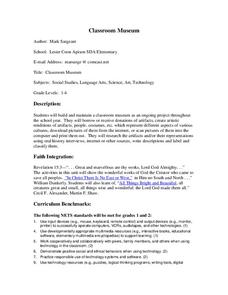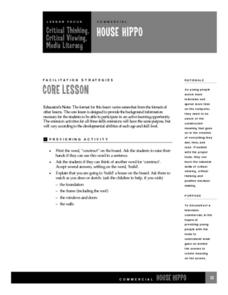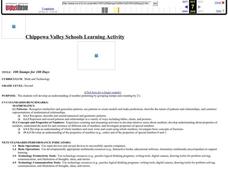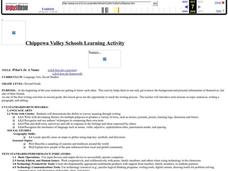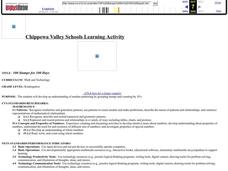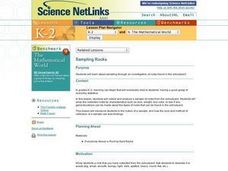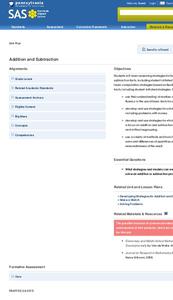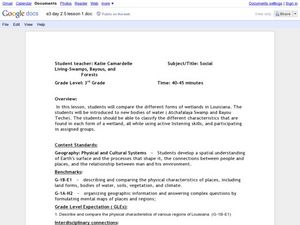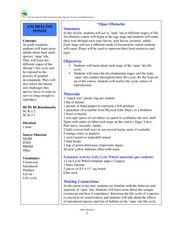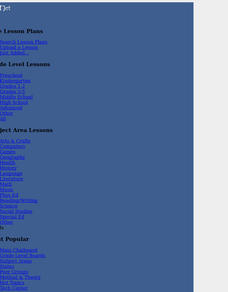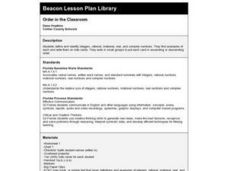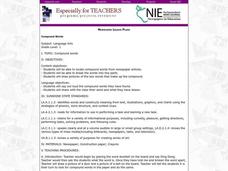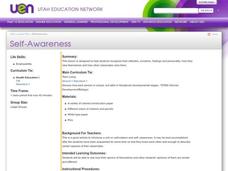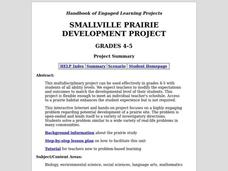Curated OER
Classroom Museum
Students investigate various aspects of culture. They collect artifacts from various resources as an ongoing project throughout the school year. Students reflect upon the differences in cultures and subject areas as they conduct research...
Curated OER
House Hippo
Students predict the purpose of a presented commercial. They discuss the challenges of making the hippo seem to be in living in the kitchen. In addition, they design a setting or background to create an illusion in their own pictures.
Curated OER
100 Stamps for 100 Days
Second graders count by 2's to get to 100. For this counting lesson plan, 2nd graders use the program Kid Pix to create stamps two at a time until they get to 100.
Curated OER
What's In A Name
Second graders write a paragraph about their findings on what their name represents. In this writing lesson plan, 2nd graders will research their name and why they were named that. They will draw a picture that represents them along with...
Curated OER
What Begins With Bb?
Students demonstrate beginning reading strategies. In this letter recognition lesson plan, students match letter sounds to a variety of pictures using the program "Kidspiration".
Curated OER
100 Stamps for 100 Days
Students recognize similarities and generalize patterns. In this math and technology lesson plan, students develop an understanding of number patterning by grouping stamps and counting by 10s.
Curated OER
Plant Parts
Students use "Kid Pix" to explore plants. In this science and technology lesson plan, students become familiar with plant parts and label them on a plant. Students tell the functions of each of the plant parts.
Curated OER
All The Seasons
Students explore winter, spring, summer, and fall. In this science and technology lesson plan, students use "Kid Pix" to draw pictures that represent the four seasons.
Curated OER
Building a Native American Home
First graders explore different types of Native American shelters. In this Native American homes lesson, 1st graders compare the shapes of shelters used by Native Americans. They build a home using the program "Community Construction...
Curated OER
Around the World
First graders match pictures of customs and traditions to the correct countries they come from. For this customs and traditions lesson plan, 1st graders will have already previewed many customs and traditions from around the world. Then...
Curated OER
Sampling Rocks
Students analyze rocks. In this rock classification instructional activity, students collect and analyze rocks that they find on the school premises. Students classify the rocks according to their physical characteristics in order to...
Curated OER
Addition and Subtraction
Students develop their own strategies to solve basic addition and subtraction facts. In this addition and subtraction lesson plan, students use strategies they already know and new ones to solve problems.
Curated OER
Living Swamps, Bayous and Forests
Third graders explore interesting environments by exploring Louisiana. For this wetland lesson, 3rd graders utilize the web to research the State of Louisiana, the bayous in the area, and the Gulf of Mexico. Students write a journal...
Curated OER
Opae Obstacles
Students explore the life cycle of shrimp. In this life cycle lesson, students research the different stages of a shrimp's life cycle. Students examine threats to the species in each stage of life.
Curated OER
Africa's Climatic Regions
Students are introduced to the different climates and vegetation of Africa, and compare them to similar climatic regions found in the United States.
Curated OER
Order in the Classroom
First graders define and identify integers, rational, irrational, real, and complex numbers. They place number cards in ascending and descending order.
Curated OER
Different! Diverse! Dynamic! Lesson 1: Late Bloomers
Young scholars examine how people grow and mature at different rates. They create a graph and a timeline to organize the data they collect.
Curated OER
Compound Words
First graders read newspaper articles and locate compound words. They break the words into two parts, then draw pictures of the two words.
Curated OER
Sense of Touch
Students explore the sense of touch. They listen to and discuss the book, I Can Tell By Touching, observe a demonstration of cold, and create a touch book using candy buttons, pine needles, cotton, burlap, and wax paper.
Curated OER
Symmetry
Students make a design with pattern blocks and then pass them on to the rest of the class. They have to make them symmetrical and complete the design.
Curated OER
All About Ants
Students create model ants in order to study the characteristics of insects such as body segments, number of legs, and feelers, as well as how these characteristics serve the insect.
Curated OER
Paper Bag Zoo
Students create animals that might be found in a zoo using paper bags, construction paper, and other materials. They present their animal to the class stating any facts that they may know about the animal and its habitat.
Curated OER
Self-Awareness
Students investigate their attitudes, emotions, feelings and personality. They determine how they view themselves and how they are viewed by others.
Curated OER
Smallville Prairie Development Project
Students, through group activities, explain the important scientific, social/historical and aesthetic values of a prairie habitat. They analyze the impact of humans on prairieland and solve a problem regarding potential development of a...


